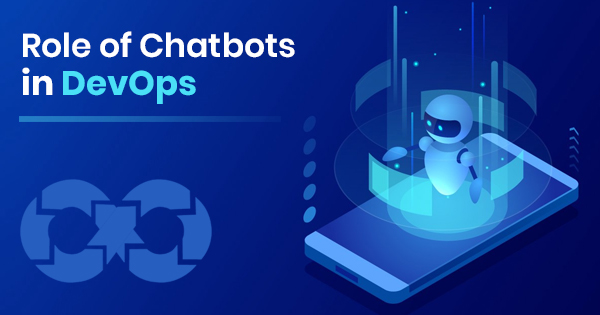DevOps has undoubtedly spurred a lot of changes in the technology landscape. It has completely redefined traditional norms evident in the domain of software and infrastructure engineering alongside operations. One of the prime notions underlying the concept of DevOps is improved collaboration and communication. So, when you look at the role of chatbots in DevOps, there is definitely evident attention you can notice clearly.
Bots can serve unique advantages of speed alongside automation in the DevOps landscape. The following discussion attempts to reflect on the various benefits of chatbots in DevOps and their use cases. Readers can explore the significance of reflecting on the capability of chatbots to revolutionize the DevOps paradigm with the highlights in this discussion.
Enroll Now: Chatbot with Dialogflow/ Nodejs Training Course
The Link between DevOps and Chatbots
One of the foremost aspects to consider in evaluating the role of chatbots in DevOps refers to the faster response of feedback and delivery systems related to the product or service. DevOps is largely adopted by companies for these functionalities that can simplify complex workflows alongside enhancing the productivity of engineering as well as operations teams.
DevOps provides a considerable reduction in turnaround time for receiving feedback, resolving the issue, and delivery of solutions to the market. So, basically, DevOps aims to reduce repetitions with the assurance of improved accuracy in the repetitive process. Therefore, chatbots can definitely find unique applications as a formidable support mechanism for DevOps.
Chatbots have slowly gained recognition in the world of DevOps automation as they allow consistent updates of all processes in DevOps workflow, such as orchestration. Chatbots have the capability of serving as a competitive communication platform in collaboration with DevOps automation to provide a substantial boost for communication, collaboration, and transparency for engineering and operation teams. Therefore chatbot use cases are more likely to gain attention and possibly achieve mainstream application in DevOps strategies.
Why Bring Chatbots in DevOps?
In order to build a strong foundation to understand the uses of chatbots in DevOps, it is important to know about the pain points in DevOps. The adoption of DevOps has obviously brought many advantages for better collaboration among development and operations teams. However, organizations also have to face many challenges for the operations of their end-to-end service delivery lifecycle. Here is an outline of the notable pain points for enterprises with DevOps.
- Creation, setup, and deployment of new environments for specific applications with complicated environment configurations imposes higher costs, time consumption, and higher vulnerability to errors.
- Manual interventions also present risks for moving or promoting code between environments and could also lead to more outages.
- Development teams look forward to improving the value of change through scripting new code or improvements in the existing code. At the same time, operations teams want to maintain service level agreements (SLAs) and KPIs. Therefore, the conflicting goals that go unnoticed in DevOps strategies can lead to the development of a culture of blame among the development and operations teams.
- The process and instrumentation gaps are also creating setbacks for synchronization between development, testing, and production operations. Manual processes could not be adequate for resolving this consistency, thereby resulting in common occurrences of production downtime.
Where Do Chatbots Come in DevOps?
Now, anyone would obviously wonder about the role of chatbots in all of this! How would bringing chatbots in DevOps solve the issues encountered by enterprises for collaboration? The best answer to this question is directly evident in the term ‘ChatOps.’ A term from GitHub, ChatOps, refers to the integration of tools in a conversation.
Users interact with various continuous integration and continuous delivery tools with different functionalities, including defect management, continuous deployment, source code management, continuous integration, and others. ChatOps helps in bridging all these tools together and implies the coordination between collaboration tools and DevOps tools.
If the problem lies in collaboration, then it is reasonable to focus on it for troubleshooting DevOps issues! Chatbots arrive as the rescue in this case as they serve as bridges between collaboration tools and DevOps tools. Chatbots in DevOps take requests from users as chat commands through collaboration tools, followed by an analysis of the request and execution of a set of commands related to the target DevOps tools.
A detailed reflection on the components of the interplay between ChatOps and bots can showcase the foundation of the benefits of chatbots in DevOps. The foremost component of ChatOps is the collaboration tool or the chat app. The front-end chat system helps in connecting different stakeholders while supporting them in mutual interactions and with associated systems.
Chatbots are the second most important component in the ChatOps concept and are basically the central tool that holds everything in place. The chatbots facilitate an easy connection between the collaboration tool and the user’s DevOps systems. Chatbots provide a two-way communication channel for fetching desired information from systems and act accordingly.
The chatbots act as the missing link between the collaboration tool of your choice and DevOps tools such as AWS Lex, Hubot, ErrBot, or Lita. The final component in ChatOps is the target platform or the infrastructure. Chatbots in DevOps should have the capability for integration with the desired target platforms.
The target platforms are the stage for the chatbots to execute required commands. The integration with DevOps tools enables chatbots to ensure communications with tools and ensure execution of actions such as building, deployment, testing, provisioning, and scaling of infrastructure from the chat window directly.
Also Check: List of Best DevOps Certifications
Use Cases of Chatbots with DevOps
The next significant point of discussion about chatbots in DevOps refers to the use cases. You can find many chatbots with higher responsiveness and intelligence capabilities for addressing different tasks. On the other hand, industry implementations are marginally different from day to day activities. The use cases of chatbots in DevOps demand the efficient resolution of problems with desired approaches.
The two most common types of use cases for chatbots with DevOps involve domain-specific bot implementation or generative bot implementation.
Domain-specific Bots
Domain-specific bots have been trained specifically with skills for a particular domain with the capabilities to understand human requirements effectively. The domain-specific bots interpret the context of a series of commands and respond to users for obtaining specific information associated with the command to perform a specific action.
Generative Bots
Generative bots are suitable for delivering answers as compared to inquiry for additional information. The generative bots also avoid the need for replying with a specific choice from a set of answers. They can take the query with every word and generate responses on the go. Generative bots are capable of addressing complex and unique queries, followed by making a relevant and accurate response.
Therefore, you can clearly notice that domain-specific bots are more suitable for the applications of chatbots in DevOps, especially due to the highly-defined requirements of DevOps use cases. Let us take a look at the different common chatbot use cases before diving into the advantages of chatbots for DevOps.
-
Retrieval of Logs
One of the foremost uses of chatbots in DevOps directly refers to log retrieval. When support teams want to know the reason of failure of a task, they have to obtain logs from different machines that run multiple services. Generally, support teams have to login or implement SSH access for respective machines and execute Linux/UNIX commands for obtaining the logs. The task seems quite simple, albeit with the concern of repetitiveness. In such cases, chatbots can address the back-end jobs after entering the IP and service name in a machine. Chatbots could access the relevant log files and speed up the process.
-
Test Case Execution
The next important mention among chatbots use cases in DevOps refers to the execution of test cases. Chatbots could call automated test cases for checking their status of the activity. For example, chatbots can help in checking account management functions through testing the success of aspects such as ‘add payment information,’ ‘account creation,’ ‘add loyalty points,’ and other functions in the test cases of the account.
Chatbots could help in testing these cases multiple times through multiple users in distinct environments. However, it is important to host the bot in a machine with access to a cluster running environment for the implementation of the above-mentioned use cases.
-
Service Health Check-ups
Another notable entry among the uses of chatbots in DevOps refers to health check-ups.Use cases that have a Hadoop cluster environment with multiple services, and daemons operational on different machines, demand frequent checkup of health of all services running on a specific cluster.
Rather than opting for the traditional repetitive process of running commands on a terminal, users can opt for chatbots. Chatbots can receive commands in human language and receive the status of health of a service. For example, the command could be as simple as ‘Show the health of XYZ service running on ABC instance.’
Advantages of Chatbots with DevOps
Apart from the various use cases of chatbots with DevOps, it is also important to reflect on their potential for boosting various steps in the CI/CD pipeline. Chatbots can serve effective functionalities in proactive planning, continuous feedback, and requirements management with JIRA. In addition, they can serve continuous integration functionalities with the capabilities of Jenkins.
Ansible and Chef can also be supported by the application of chatbots to improve continuous deployment. Most important of all, the integration of chatbots with different DevOps tools such as Nagios, Splunk, and Grafana provide a reliable boost for continuous monitoring functionalities. Chatbots in DevOps would not just introduce better collaboration and faster problem troubleshooting but also deliver many potential advantages in the following ways.
- Cleanup of servers and rotation of server logs
- Collection of metrics from tools like AppDynamics and Nagios
- Starting off build and deployment jobs
- On-boarding application for monitoring tools
- Smart and responsive alerts for prompting faster action
- Orchestration of workflows such as incident escalations, code deployment, and incident management
- Required termination of apps, services, or virtual machines along with monitoring
The above-mentioned benefits of chatbots for DevOps are also supported by many other domain-specific advantages of bots. First of all, the use of chatbots in DevOps must emphasize the fact that they are not a command-based agent. Therefore, you don’t have to use commands for taking certain actions with the help of chatbots.
Chatbots could be crucial instruments for simpler interaction in DevOps with regular human language. Chatbots provide a trusted layer of authorization. Most important of all, support teams could save a lot of time and resources, thereby improving their efficiency. Furthermore, all teams could make the most of DevOps tools with chatbots for achieving optimal productivity and effectiveness.
Preparing for a DevOps interview? Go through these top DevOps interview questions and get ready to ace the interview.
Bottom Line
On a concluding note, it is evident to point out the potential for advancements in chatbots. Although the use of domain-specific bots is quite predominant in DevOps at present, there is no harm in considering the prospects of AI-based bots making an impact in DevOps. The use of chatbots in DevOps extends beyond the general assumption that rests on the ‘communication and collaboration’ narrative.
Chatbots bring speed while also ensuring coordination in the tasks and communications across teams. Most important of all, chatbots provide added functionality by bringing tools that DevOps teams need at one place. Learn more about chatbots and how they can define the future of DevOps right now!
If you’re aspiring to build a successful career in DevOps, join us and check out our Chatbot with Dialogflow/ Nodejs training course to take your DevOps career to the next level.
- Top 10 Highest Paying Cloud Certifications in 2024 - March 1, 2023
- 12 AWS Certifications – Which One Should I Choose? - February 22, 2023
- 11 Kubernetes Security Best Practices you should follow in 2024 - May 30, 2022
- How to run Kubernetes on AWS – A detailed Guide! - May 30, 2022
- Free questions on CompTIA Network+ (N10-008) Certification Exam - April 13, 2022
- 30 Free Questions on Microsoft Azure AI Fundamentals (AI-900) - March 25, 2022
- How to Integrate Jenkins with GitHub? - March 22, 2022
- How to Create CI/CD Pipeline Inside Jenkins ? - March 22, 2022



